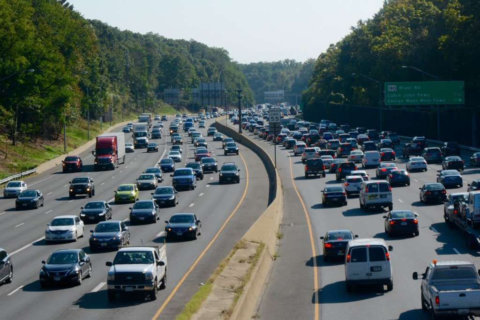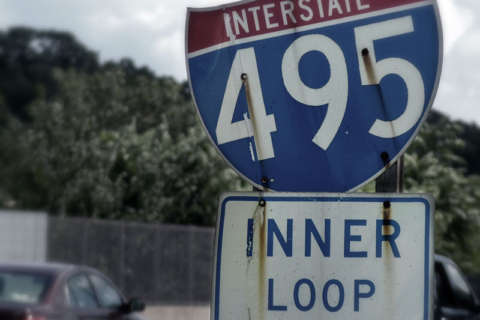The proposal to widen the Capital Beltway and Interstate 270 needs more oversight, according to a group of Maryland lawmakers — and they are racing to get a bill on public-private partnerships passed before the General Assembly session ends on Monday.
Del. Jared Solomon, a Democrat who represents Montgomery County, is championing a bill that would add layers of scrutiny to so-called P-3 projects, such as the multi-billion dollar plan for I-495 and I-270.
Solomon said the bill “would bring financial oversight to make sure that we understand the impact on the state’s credit rating and what kind of risks the state could be entering into on the financial side” when P-3 agreements are signed.
Montgomery County councilmember Tom Hucker, a Democrat and a former state delegate, said P-3 legislation that passed in the General Assembly was intended to get the Purple Line funded.
“It was never intended to be a way for the governor to deliver projects as an end-run around local governments and around the General Assembly,” Hucker said.
If it passes, HB 1091 could delay widening the Capital Beltway and I-270, but Solomon said that he is not in favor of gridlock.
“I live five minutes from the Beltway. I don’t like traffic; I don’t like wasting my time. I just want to make sure that we’re doing it right,” he said, referring to the plans to widen two of the region’s most congested arteries.
At a news conference with Solomon and state and local leaders in Annapolis, Montgomery County Executive Marc Elrich said the plans for I-270 don’t require a P-3 project.
“This requires paint and a little bit of concrete,” Elrich said. He explained that he and the members of the Montgomery County council favor adding reversible lanes to I-270 and using existing service lanes to effectively widen the road.
Maryland Secretary of Transportation Pete Rahn said Elrich’s take on reversible lanes could work given today’s traffic levels, but not for what’s coming in the future. “Two reversible lanes are not enough to accommodate the growth that’s going to occur” in Montgomery County and in Frederick.
Speaking at the news conference in Annapolis, Brad German, with Citizens Against Beltway Expansion, criticized state transportation officials, saying they’ve been ignoring concerns from the public about the impact of the project.
“There’s really no evidence they’re paying attention to public comment, to public concerns,” German said.
Peter Altman, of Don’t Widen 270.org agreed, and he was critical of the public presentations from the Maryland Department of Transportation and the State Highway Administration so far, saying: “MDOT has got an agenda here of widening the road regardless of what the local communities want and what the feedback is, which is why we consider those road shows to be, well, dog-and- pony shows.”
Some civic groups have complained that transit solutions as part of the project have been ignored.
Rahn said critics of the presentations MDOT and SHA held so far don’t understand the environmental study process. He said the next series of public workshops will provide more answers to the questions the public has.
He also said that under the “purpose and need” of the project, transit doesn’t solve issues that have to be addressed, including moving freight.
“It’s not that we didn’t listen,” Rahn said. “The items listed did not mean the purpose and need of the project.”
On the issue of transit, Rahn said Gov. Larry Hogan’s administration has made substantial investments in transit: from adding money for Metro, to moving ahead with the Purple Line and updating transit in Baltimore City.
“We make those investments, yet people still choose — for whatever reason — to stay in their car,” Rahn said.
Solomon said if the bill manages to pass but is vetoed by the governor, he would work on getting support to override a veto in the next legislative session.
WTOP’s Kate Ryan reported from Annapolis, Maryland.








